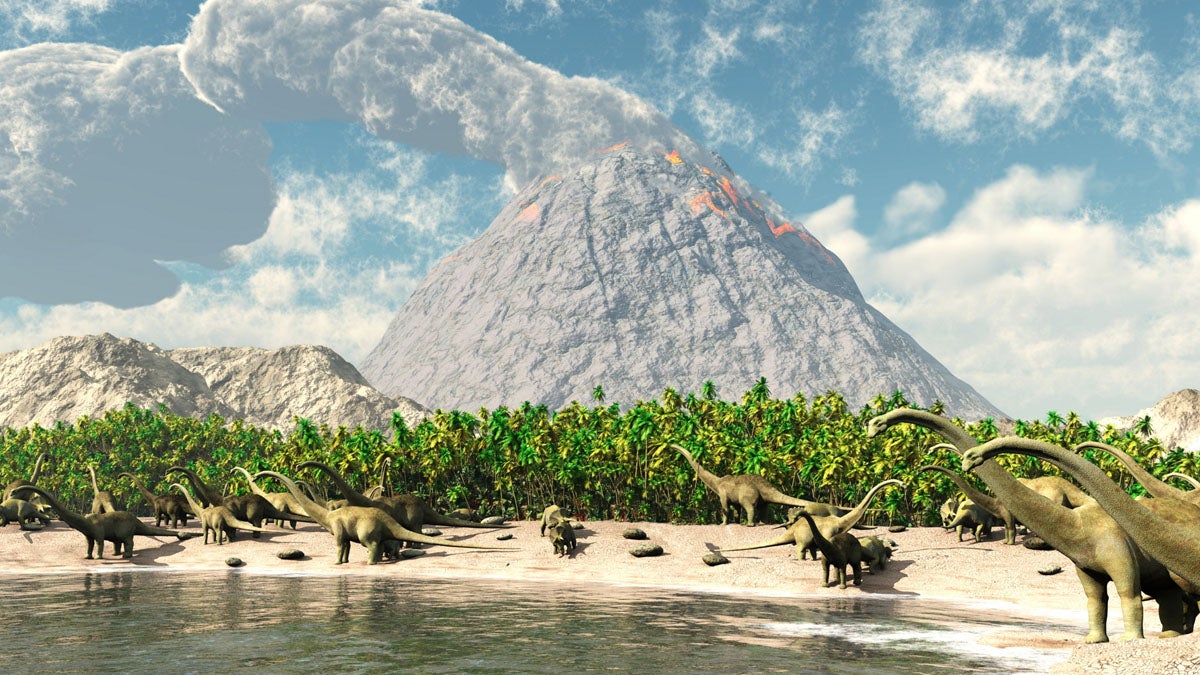Volcanoes may have contributed to dinosaurs’ demise, Princeton scientists find
Listen Photo via ShutterStock) " title="shutterstock_112639184" width="1" height="1"/>
Photo via ShutterStock) " title="shutterstock_112639184" width="1" height="1"/>
New research from a Princeton University team suggests that volcanoes may have helped hasten the die-off of dinosaurs 65 million years ago.(Photo via ShutterStock)
The demise of the dinosaurs 65.5 million years ago is usually attributed to a meteor that crashed into Mexico’s Yucatan peninsula. But new research from Princeton University suggests that event may not have been the only disruption of prehistoric life.
Volcanic eruptions, specifically those on the western coast of India that came to form the Deccan Traps, have long been considered complicit. But Blair Schoene, an assistant professor of geosciences, said scientists lacked accurate records to place them at the scene.
“They hadn’t been dated to better than plus or minus one or two million years,” he said, “which is not really sufficient for the type of questions that people are asking related to the extinction event.”
To get a better timeline, Schoene and his team took samples of petrified ash and lava containing zircon from the Traps. The mineral can be used for radiodating because it contains trace amounts of uranium, which decays over time into lead.
Based on their analysis, the first eruptions began about 250,000 years before the dinosaur die-off. In total, more than a quarter-million cubic miles of lava blanketed the Earth out before halting some 750,000 years later.
Precisely how the eruptions might have triggered mass extinction isn’t clear, but Schoene suspects influxes of carbon dioxide and/or sulfur dioxide. Both could result in environmental catastrophes over the long term, which could potentially explain the 250,000-year period before extinction.
Schoene noted that Earth has a long history of volcano-related extinction, often with similarly delayed chronology.
“If you look over the last 500 million years or so, there’s been a number of major mass-extinction events,” he said. “Nearly all of these — something like 80 percent — coincide with these very large volcanic eruptions.”
While Schoene’s results, which were published this month in the journal Science, don’t preclude the widely accepted meteorite theory, they suggest extinction might have been under way well before any impact.
“Clearly both happened,” said Schoene. “Both were really important, so the question is what was the effect of each of them.”
Schoene will be returning to India in a few weeks to collect more samples and try to get a better sense of when the lava flows might have been most intense.
Regardless of the cause, the death of the dinosaurs (excepting their avian counterparts), along with many other plants and animals, ushered in the current Cenozoic Era — and ultimately led to the rise of mammals.
WHYY is your source for fact-based, in-depth journalism and information. As a nonprofit organization, we rely on financial support from readers like you. Please give today.

